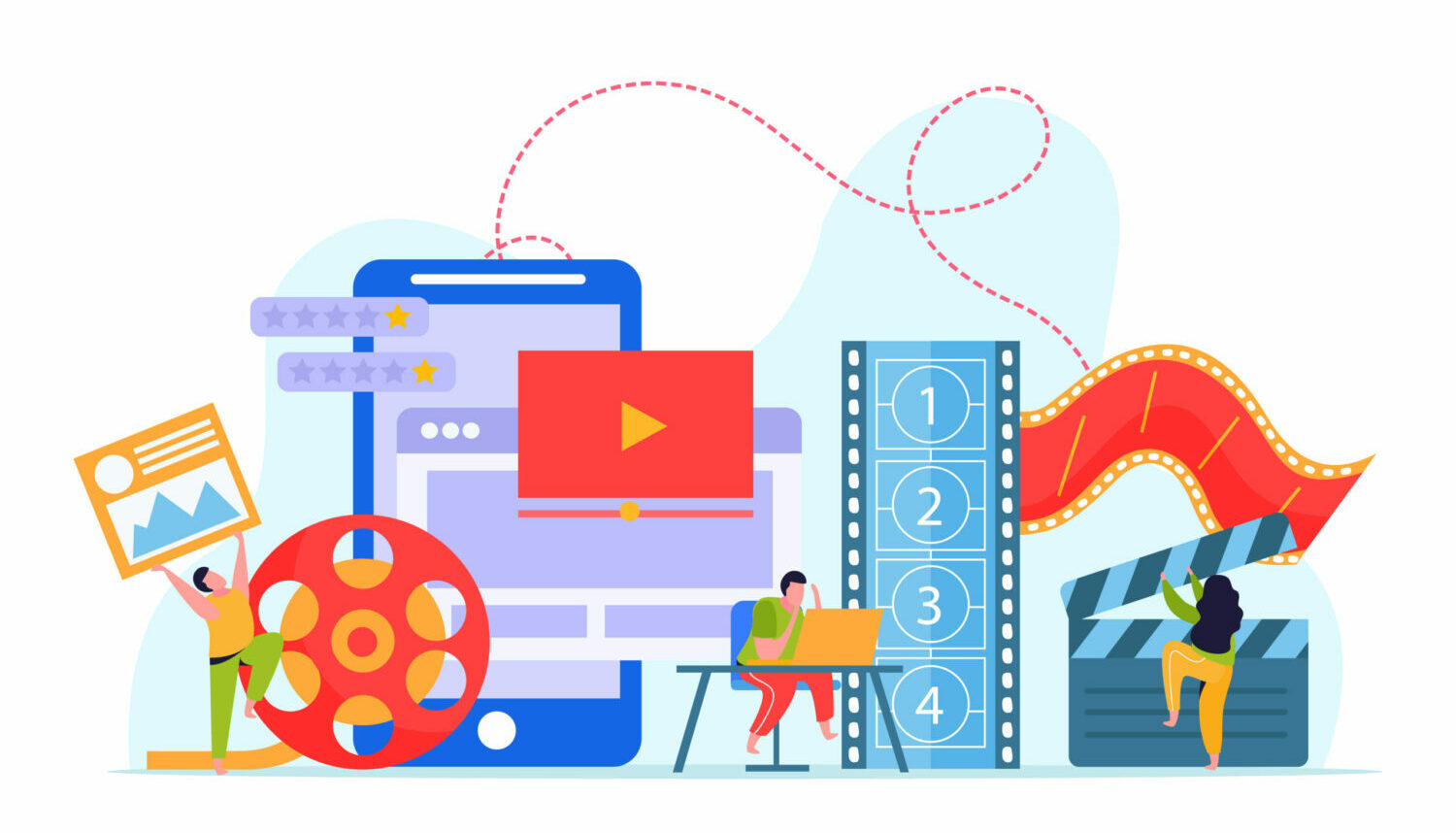M+E Daily

HITS 2023: WiTH Explores How to Transform Workforce Training With Films
Story Highlights
Innovative training within an organization or business division helps increase psychological safety, the individual, team and organizational aptitudes that drive innovation and an equitable company culture, according to film and TV industry executives who spoke May 23 at the Hollywood Innovation and Transformation Summit (HITS) at The Culver Theater.
During the Women in Technology: Hollywood (WiTH) panel session “Film Forward: Transforming Workforce Training with Award-Winning Films,” they provided a look behind the scenes at how their content ecosystem increases access and career sustainability for the creators on whose work the programs are built.
Among those providing examples were Emily Best, founder of Seed&Spark, a crowdfunding platform for independent film, and Film Forward, an experiential learning platform for a dynamic, creative and diverse workforce. Film Forward replaces boring corporate training videos with groundbreaking learning journeys built around award-winning short films from around the world, she said. The platform delivers a range of curricula as monthly learning modules — from employee onboarding, to diversity, equity and inclusion (DEI) education to management and inclusive leadership training — that build capacity for employees and deliver deep insights for leadership.
“I got into this not because I thought I was going to be in the movie business but because I didn’t like the way women were represented on screen,” she said. “So, about 12 years ago, we endeavored to make a feature film with some other really incredible women, and we hit every barrier you could possibly imagine, including a really helpful sales agent who told us that if we could put some lesbian erotica in our film, he would sell it. But he didn’t even mean lesbian erotica for lesbians. You know what I mean? I’m grateful to him because I think everything that came after that was because of that one moment. So maybe all of this was built on spite.”
 However, she pointed out that sometimes such an incident “can be a great motivator.”
However, she pointed out that sometimes such an incident “can be a great motivator.”
Taking a walk down Memory Lane, she reflected back about 12 years ago, “when social media was getting really widely adopted.” Meanwhile, “crowdfunding sort of rose out of the ashes of the 2007-2008 financial crisis as an opportunity for creators to connect directly with audiences,” she noted. Additionally, “broadband was getting widely enough adopted that it seemed like we might actually be able to stream movies regularly.”
She added: “Those things were all coming together and so Seed&Spark was born out of a moment in history when creators were looking at each other, saying: ‘Did they give us everything we needed?’ ‘I think they did.’”
Getting Out of the Echo Chamber
“The reason that Film Forward started was because our creators saw a challenge,” recalled Best. “So our creators came to us in around 2018 and they said, ‘Gone are the days of the open social graph.’ And now really gone are the days of the window of distribution. And now pretty much everything we make is marketed on social media and streamed on streaming platforms. And those are both completely dominated by algorithms. So we’re stuck in an echo chamber. We’re talking to people who already look like us and already agree with us, and that’s not ultimately why we make work. We make work to change people’s minds and challenge their worldview. And if we’re only speaking to people who think like us and look like us, we’re just reinforcing the confirmation bias. And while, yes, making representative content is important so that every person has the experience of seeing themselves on screen … most creators are trying to make representative content so other people believe their stories are worthy of that treatment.”
She added: “You have to get out of the echo chamber to actually have the impact [with] the content. So there’s a ton of work happening in Hollywood right now to diversify the content but it’s being delivered through technology to an echo chamber. And so when they presented us with this problem, we were like, ‘Let me see if I understand: You would like us to deliver your films at scale to people who don’t identify as the audience for this work without using social media or streaming?’” And the response was yes. That’s what they wanted.
At the time, she recalled thinking they would “have to get out of the entertainment business because ‘I haven’t seen any of your solutions that way.’”
But she said: “A really smart advisor of ours said, ‘Have you thought about the workplace? The workplace is the most diverse place most people are in their lives. And if you could figure out a way to deliver films at scale into the workplace, you really might have something.’”
So Film Forward “did six months of research in 2019,” speaking to “hundreds and hundreds of people, leaders, DEI leaders, CEOs, CFOs, she noted.
After all, she explained: “You’ve got know how the money moves to understand what were the core challenges.”
Number one among those challenges is “nobody likes a corporate training video or believes it particularly works well, and that [is borne] out in the data: 72% of employees report tuning out video-based professional development training,” she said.
“The second thing we learned is that the challenges that they were trying to solve with professional development, with training were really big, hard, complex problems,” she said. While “inclusion and belonging is certainly one of them … it was also innovation, leadership, resilience, retention, engagement. And the interesting thing about those problems is what they all have in common is that they’re collective sense-making problems.”
Right in the middle of Film Forward’s research, she recalled: “We were lucky. Google drops Project Aristotle and Project Aristotle was seeking through a long-term study what creates high performing teams and the number one key indicator of high performing teams is psychological safety.”
That concept is made up of “four components, and I have a business card that actually has the wheel of psychological safety in the center of it,” she said. “Belonging safety is the baseline, not the apex. So creating belonging in the organization is the literal least you can do to create high performing teams.”
She went on to note: “On top of that, there has to be learner safety. I can try things and fail, ask questions, and not be punished.” Then there is “contributor safety: ‘My skills are valued here and I can actually put them into place.’”
And then comes “the hardest one for all organizations,” which she said is challenger safety, meaning “I can raise my hand and be like, ‘This movie sucks. We shouldn’t release it like this’ or whatever your version” of that is.
Film Forward built those concepts into its programs, she pointed out.
She added: “I think also what Film Forward is doing really well, that’s exciting, that we didn’t even anticipate is it’s reminding people why art matters and that art can matter in places you least expect it. People don’t have to seek it out to be blown away by it. And that’s what’s been really thrilling.”
Sony’s Take
Zack Hall, VP, people and organization business partner, TV production at Sony Pictures Entertainment, recalled that he received an email in November about the Film Forward project. “They do a survey at the start and at the end to measure progress and they get really meaningful lifts and inclusive behavior during the program,” he noted, adding: “Given that my client was the TV studio and full of creative people and we were one year into an initiative called Time for Change, where we launched our own group within the TV studio to enhance diversity and inclusion, I was heading up the employee subcommittee. So I was focused on what could we do for employee development and hiring around DEI topics. So I was on the lookout for what that next thing could be and Film Forward’s products sounded amazing.”
Hall said he suggested doing a pilot with Film Forward and what happened was an “accelerated pilot for about 50 people and we invited a couple employees from the TV studio, plus all of the key stakeholders you need when you implement a new program … and it was really successful. So we rolled out the full product in January of this year.” He added that Film Forward is offering a six-month program that includes one short film each month that’s emailed employees and there are ”some facilitated discussions, surveys at the start and end, [and] it’s going really well and our employees are responding to it incredibly well.”
One thing that is “amazing” is that the short films being presented were “not commissioned to be DEI training videos; they just happen to be amazing short films that have won awards,” he added.
Another fan of Film Forward is Hilarie Holt, VP of U.S. scripted programming at Sony Pictures Television. “I love entertainment,” said Holt. “I love being entertained. I love entertaining people. And the great thing about Film Forward is there’s this intersectionality that it is entertaining. It is in the fiber of what we do every day. We all watch short films and movies and writers and directors. It feels natural to what our day-to-day activities are at the studio and it gets us thinking in a really progressive way what diversity and inclusion looks like in our storytelling, in the filmmakers we employ and work with. And it’s just been a really satisfying, wonderful time to have these conversations in a very safe space in our Sony community.”
Filiz Bahmanpour, VP of product at Gracenote and a WiTH board member, moderated the panel session.
The Hollywood Innovation and Transformation Summit event was produced by MESA in association with the Hollywood IT Society (HITS) and presented by Amazon Studios Technology, with sponsorship by Fortinet, Genpact, Prime Focus Technologies, Signiant, Softtek, Convergent, Gracenote, Altman Solon, AppTek, Ascendion, Coresite, EPAM, MicroStrategy, Veritone, CDSA, EIDR and PDG Consulting.









